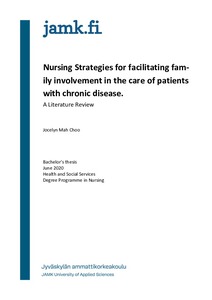Nursing Strategies for facilitating family involvement in the care of patients with chronic disease.
Jocelyn, Mah Choo (2020)
Jocelyn, Mah Choo
2020
All rights reserved. This publication is copyrighted. You may download, display and print it for Your own personal use. Commercial use is prohibited.
Julkaisun pysyvä osoite on
https://urn.fi/URN:NBN:fi:amk-2020061919169
https://urn.fi/URN:NBN:fi:amk-2020061919169
Tiivistelmä
Chronic diseases affect more than 50% of the world’s population, and represent the leading cause of disease burden. Patients and developed professional services cannot meet up with the complex routines and duration of chronic disease care. Involving family in the care process and supporting them has improved outcome for patients, families and nurses. Nurses have acknowledged family support, and have played significant role in involving and supporting them in their patient’s care process. However, there are limited resources to guide them.
The aim of this study was to identify strategies used by nurses to facilitate family involvement in the care of adult patients (≥ 18 years of age) with chronic disease. The purpose was to provide information that nurses and other health care professionals working with families and patients could use.
The study is a literature review of 15 articles, published between 2009 and 2018. Data was searched using Cinahl and Medline databases, and analyzed using content analysis.
Three main categories and eight sub-categories emerged in the data analysis. The three
categories were, information sharing, collaborative partnership and support patterns. Better outcome was achieved when each strategy was tailored to patients’ disease pattern, and patient/family individual needs. Based on the results of this study, exploring, acknowledging individuality and therapeutic action, could be considered the logical order of nursing strategies, which can facilitate the integration of family in patients’ care process.
All the strategies identified in this study, may not be applicable to every patient/family.
Further research is needed to determine whether these results or strategies are applicable
to family members across different cultures.
The aim of this study was to identify strategies used by nurses to facilitate family involvement in the care of adult patients (≥ 18 years of age) with chronic disease. The purpose was to provide information that nurses and other health care professionals working with families and patients could use.
The study is a literature review of 15 articles, published between 2009 and 2018. Data was searched using Cinahl and Medline databases, and analyzed using content analysis.
Three main categories and eight sub-categories emerged in the data analysis. The three
categories were, information sharing, collaborative partnership and support patterns. Better outcome was achieved when each strategy was tailored to patients’ disease pattern, and patient/family individual needs. Based on the results of this study, exploring, acknowledging individuality and therapeutic action, could be considered the logical order of nursing strategies, which can facilitate the integration of family in patients’ care process.
All the strategies identified in this study, may not be applicable to every patient/family.
Further research is needed to determine whether these results or strategies are applicable
to family members across different cultures.
